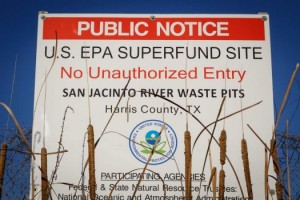UPDATE: This bill passed in the House 96 to 44 on Monday, April 27. There is still a chance to stop it in the Senate. Call your Texas senator and ask him or her to vote no on HB1794 when it comes up.
On Monday, the Texas House of Representatives will consider another bill that attacks local control and would protect polluters. HB 1794 by, Representative Charlie Geren would place a cap on the amount that local governments can assess in civil penalties for violators of environmental regulations. The penalty would be capped at $4.3 million in total fines and a five year statute of limitations would be put in place on the filing of such law suits. While Geren describes his bill as a way to curb “lawsuit abuse” these caps would really just erode the ability of local cities and counties to collect on damages from major polluters in cases in which the clean up far exceeds $4.3 million.
This is bad legislation because cities and counties need the ability to force polluters to pay civil penalties because state enforcement of environmental laws is so weak. The Texas Commission on Environmental Quality (TCEQ) does not have the resources or the guts to go after the biggest polluters, and those are the polluters that are going to get away with penalties that are far less than would be needed to actually clean up their mess.
For example, this legislation comes largely as a response to the high profile litigation between Harris County and three companies liable for the San Jacinto Waste Pits, an EPA superfund site and one of the biggest environmental disasters of the past decade. The pits were first dug in 1965 by a paper company for disposal of its waste from nearby mill. Hundreds of thousands of tons of waste with a highly toxic chemical called dioxin was dumped on the river’s west bank. A few years later the pits were abandoned.
Later, a natural environmental processes took place,-the river moved. What was once a waste dump next to the river became a waste dump in the river. In the following decades, communities were built on the banks of the San Jacinto river and the families that lived there were unaware of the toxins they were living right on top of. New companies moved in who ignored the waste pits, so they did not get discovered until 2005, decades after the dumping began.
Local authorities, environmentalists and citizens of nearby neighborhoods contend that the waste pits have caused incalculable harm to the ecosystem and are responsible for a cluster of cancers and other diseases in these communities. The estimated cost of complete remediation is somewhere between $100 million and $600 million, well above what Geren’s proposed cap. The estimated medical costs for the 17,000 people living on top of these waste pits is incalculable.
The San Jacinto Waste Pit civil court settlement that inspired HB 1794 was for $29 million from two companies. Far from being excessive, this is an amount that won’t come close to covering the costs to the local community.
County or city led lawsuits seeking penalties are relatively rare. In most cases companies pay their fine and clean up their site, however not all of them do. In those cases where the company and the state environmental agency have failed to solve the problem, local governments are all that’s left. We do not need legislation that hamstrings the ability of local governments to penalize the biggest polluters and offenders of the law. Communities that are home to these polluting industries will suffer.
Email your state representative now to voice your opposition to this bill.





